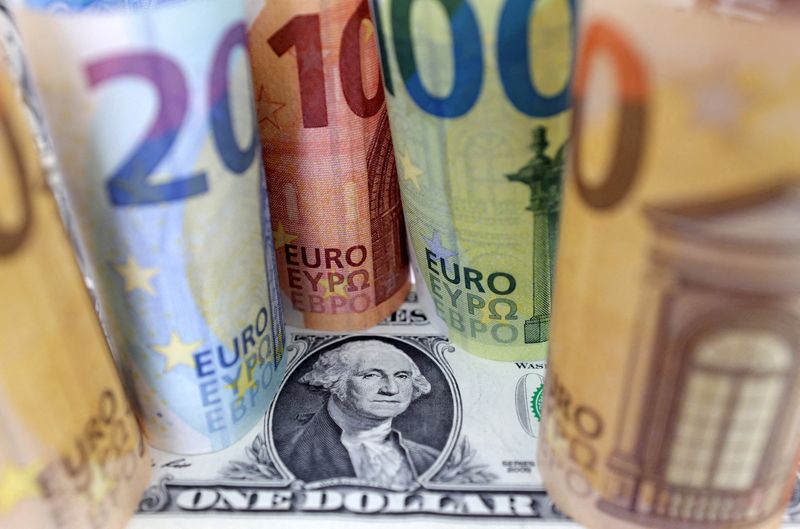By Dhara Ranasinghe and Alun John
LONDON (Reuters) - Once hurt by crises and deflation, the euro is gaining popularity among central bank reserve managers thanks to a return to positive rates and geopolitics challenging king dollar's appeal.
Roughly one in five of the 75 central banks surveyed by the London-based OMFIF think-tank anticipate increasing euro holdings over the next two years, its recently published 2023 report showed.
While 7% looked to decrease euro holdings, net demand was higher than for any other currency during the period and a jump from the 2021 and 2022 surveys of reserve managers controlling nearly $5 trillion.
Shifts can take years to play out. The dollar, which makes up 60% of global reserves versus the euro's 20%, will not lose its crown overnight.
Yet, a more positive euro outlook speaks to notable changes taking place.
For starters, the European Central Bank's exit from negative interest rates in 2022 drove euro area government bond yields higher after almost a decade below 0%, and they should remain elevated even as rate cuts near.
Germany's 10-year Bund yield has stayed above 1.9% since late 2022.
"Now the euro is positive yielding, (reserve managers) are looking to increase their currency allocation to the euro and specifically away from the dollar," said Taylor Pearce, OMFIF senior economist.
"For some central banks, because the euro wasn't yielding anything, they had held a higher share of dollars and especially dollar-denominated government bonds."
Poland's central bank, whose reserves are dominated by dollar and euro-denominated assets, told Reuters that while it did not comment on changes to reserves, "medium-term expected returns for euro area government bonds have improved considerably, which certainly increases the appeal of the asset class".
Romania said it planned to maintain the target weight of euros in its reserves at 40-75%; the current share is around 59%.
Reuters contacted 10 central banks in Europe, Africa and Asia; two declined to detail their intentions citing market sensitivity and six did not respond.
DE-DOLLARISATION
While an energy shock and war in Europe has hurt the euro, the United States' rivalry with China and fallout from Russia's war in Ukraine have fuelled talk of diversification away from the dollar.
The United States, Europe and others froze around $300 billion of Russian assets after it invaded Ukraine, prompting analysts in China to evaluate how it could mitigate losing access to dollars.
Several currencies, including the euro, could benefit from de-dollarisation.
OMFIF's survey showed a net 13% of reserve managers plan to hold more Chinese yuan over the next two years, though down from over 30% in 2022.
"Europe has not really followed U.S. foreign policies against China or on the Middle East," said Eurizon SLJ Capital CEO Stephen Jen. "A shift in balance in allocations away from dollars toward euros makes a lot of sense."
The dollar's share of total foreign exchange reserves declined to 59% in 2023 from around 72% in 2000, IMF data shows. The yuan's share has inched up.
While still dwarfed by the $26.5 trillion U.S. Treasury market, 'safe' European assets have been boosted by surging bond sales to fund spending and joint EU bond issuance of up to 800 billion euros for the post-COVID recovery. There is talk of further joint issuance for defence.
Foreign interest is growing too.
Belgium saw demand from non-European investors for a 10-year bond sold via a syndicate of banks in January, double compared to a similar bond sale a year ago.
Its debt agency head Maric Post said most of the foreign investors were from Asia and the rise in interest from public institutions came from central banks globally.
Asian investors accounted for 34% and 27% of two of three bonds sold by supranational body European Financial Stability Facility this year, which it says is an increase from recent years.
"As well as the biggest economies in Asia, some of the smaller investors also started buying, which I saw as a very positive thing, and we also started getting African investors coming into our books next to the Middle Eastern ones," said EFSF and European Stability Mechanism CFO Kalin Anev Janse.
European cohesion and unity following COVID and the Ukraine war were all seen as positives by investors and analysts.

"In 2011 I had difficulty selling Europe, in some investor meetings I would be thrown out if I was positive about Europe," said Anev Janse.
"Now if I say I’m positive about Europe they say 'yes, we agree'.